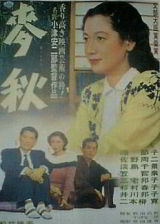 Welcome to the April 2012 edition of the Akira Kurosawa online film club, where we watch and discuss a new film every month. This month, our attention will be directed at Yasujiro Ozu’s 1951 work Early Summer (麦秋, “Barley harvest time”), while continuing to keep our last month’s feature, Kurosawa’s The Idiot, also at the back of our minds.
Welcome to the April 2012 edition of the Akira Kurosawa online film club, where we watch and discuss a new film every month. This month, our attention will be directed at Yasujiro Ozu’s 1951 work Early Summer (麦秋, “Barley harvest time”), while continuing to keep our last month’s feature, Kurosawa’s The Idiot, also at the back of our minds.
Early Summer and The Idiot have a number of things in common. To begin with, both films were released in 1951, in fact only four months apart from one other. They both star Setsuko Hara, although in very different roles and performances. The two films also share two other actors: Chieko Higashiyama plays a mother in both films, while Kurosawa regular Kokuten Kodo (10 Kurosawa films) makes his only appearance for Ozu, playing the role of the Uncle in Early Summer.
Thematically, both works can fairly straightforwardly be identified as post-war films. In March, we discussed the possibility of interpreting The Idiot as a “post-apocalyptic work” as suggested by Alexander Burry. Early Summer, meanwhile, concerns itself with marriage and topics such as changing family dynamics in post-war Japan. In doing so, it closely resembles Ozu’s 1949 film Late Spring, which we watched last year. With the two films sharing a very similar story, same core actors and even character names, the obvious question to ask is why Ozu felt like returning to the topic only two years after Late Spring and what the relationship between the two films really was meant to be. Together with Ozu’s 1953 Tokyo Story, which we will be watching in June, the three films constitute what is called Ozu’s “Noriko trilogy” after the fact that the three films all feature a main character called Noriko, played by Setsuko Hara.
An in-depth discussion of Early Summer can be found in David Bordwell’s Ozu and the Poetics of Cinema, which can be downloaded for free from the Centre for Japanese Studies website (pdf, 423mb). I would highly recommend taking a look at the book and its section on Early Summer, and would especially like to point out Bordwell’s observation about Ozu’s use of narrative gaps, or how the film skips over sequences that one would consider central to the story, most importantly Noriko’s wedding at the end. This is a narrative technique which also Kurosawa was exploring at the time, first in Rashomon which was built entirely around the question of missing pieces of information, then in The Idiot (although due to the studio cuts it is difficult to say to what extent), Ikiru where the sequence of events is reconstructed after Watanabe’s death, and finally and perhaps most prominently in Seven Samurai, which repeatedly skips over exposition, arguably partly to confuse the audience and partly simply to move the story forward.
For information about the availability of Early Summer, see the Akira Kurosawa online film club page. The page also includes our full schedule.
For our discussion of Late Spring from last August, see these links:
– Film Club: Late Spring
– About that vase…
– Noriko and the way she moves
– Sexuality in Ozu and Kurosawa
– Two Hattoris, one Satake and one half of Gary Cooper
In May, we will be watching Kurosawa’s Ikiru. For availability information, see the Kurosawa DVD guide.






Great introduction as always, Vili.
A few years ago a friend gave me the ‘Noriko Trilogy’ as a birthday present – Tokyo Story, Late Spring and Early Summer. At the time, I thought Early Summer was a very inferior work compared to the other two, which I have watched several times while I only watched Early Summer the once.
I watched it last night and while I don’t think it has the depth of the very best of Ozu, I found much in it that is very intriguing. Its significantly longer than the other film (Ozu films are usually quiet short) and rambles a bit at times, it doesn’t have that subtle focus Ozu films usually have I think. It benefits from a terrific ensemble cast, lots of familiar faces in it from other Ozu and Kurosawa films, and unlike the other two ‘Noriko’ films it is very funny in spots. Oddly enough, as I’m a big fan, I thought that Setsuko Hara was one of the weak links in the film, she seemed a bit miscast in it for reasons I can’t quite put my finger on. While in Late Spring her character is fascinating in her opaqueness, in this film I found her character a little irritating in her indecisiveness.
One striking point about the film is that it is almost devoid of serious character conflict – there is no ‘bad’ person in the film – the conflicts are almost entirely internal (the characters inner confliction about what to do), or entirely lighthearted (Noriko’s female friends are always bickering about whether its better to be married or single, but its really just good natured banter between friends). Without exception, the characters are well meaning and likeable, even if occasionally a little misguided. Ozu made other films like this of course, but this one seems to be at the extreme of his generally optimistic view of human nature and Japanese families.